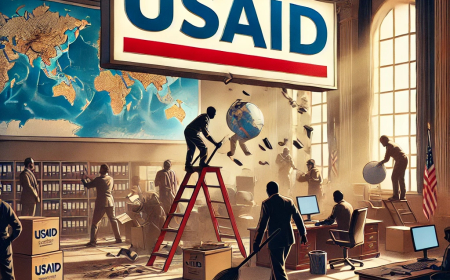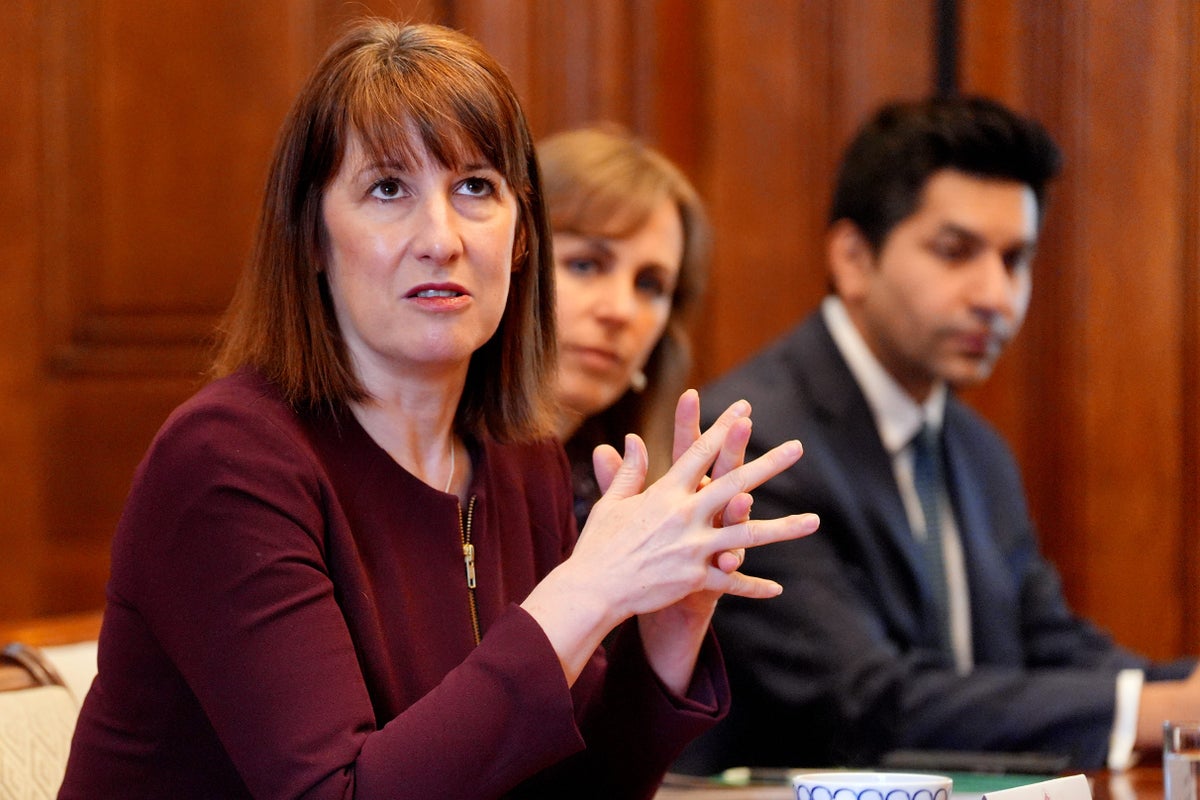Rubio, Witkoff mix expertise, dealmaking for Trump on Russia-Ukraine
When President Trump sat down for a high-stakes meeting in Alaska with Russian President Vladimir Putin, there were two men by his side: Secretary of State Marco Rubio and special envoy Steve Witkoff. When Trump phoned Ukrainian President Volodymyr Zelensky and European leaders from Air Force One after the meeting, it was Witkoff and Rubio sitting nearby...

When President Trump sat down for a high-stakes meeting in Alaska with Russian President Vladimir Putin, there were two men by his side: Secretary of State Marco Rubio and special envoy Steve Witkoff.
When Trump phoned Ukrainian President Volodymyr Zelensky and European leaders from Air Force One after the meeting, it was Witkoff and Rubio sitting nearby in a photo released by the White House of the call.
They have emerged as the key players shaping foreign policy in the second Trump administration and have been at the center of efforts in recent weeks to pursue an end to the war in Ukraine.
The two bring differing backgrounds and experience: Rubio is a former senator and presidential candidate whose name has been floated as a potential GOP nominee in 2028. In a significant signal of his importance to the president, he also serves as national security adviser, making him only the second person in U.S. history to hold that dual-hatted role.
Witkoff is a businessman, personal friend and business partner to Trump. With no prior government experience, the president dispatched Witkoff early on as the point person in talks to free hostages held by Hamas and craft a ceasefire acceptable to Israel, and to meet face-to-face with Putin.
He is the only one of Trump’s special envoys to receive a swearing-in ceremony at the White House. Witkoff started out as Trump’s special envoy for the Middle East, then special envoy for Russia, before taking on the more expanded title of special envoy for peace missions, a nod to his role in securing a peace agreement between Armenia and Azerbaijan.
“I think that it’s good they come from different backgrounds and bring different expertise to the table,” said Leslie Shedd, a former spokesperson with the House Foreign Affairs Committee and president of Rising Communications. “I don’t necessarily think that’s why the president picked them, though. He selected them primarily because he trusts them and feels like they understand his vision and have been relentless in pursuing that.”
Critics of Trump, Rubio and Witkoff have emerged throughout the second Trump administration. Democrats have expressed regret about voting to confirm Rubio as secretary of State. Some former government officials have questioned Witkoff’s lack of expertise. And many Trump critics have suggested he is getting played by Putin, who wants to drag out the war in Ukraine.
Sen. Jeanne Shaheen (D-N.H.), the ranking member of the Senate Foreign Relations Committee, said a clearing out of regional experts at the National Security Council and experienced diplomats with the State Department has hampered the ability for Witkoff, and the administration, to be successful. She pointed to Witkoff reportedly misrepresenting Putin’s position on reaching a peace deal as evidence for critics he is out of his league.
“Because he didn't have the kind of note taker, the kind of background from the State Department and their expertise to back him up, it makes a difference,” Shaheen said in a call with reporters last week, ahead of the Trump-Putin summit.
“Diplomacy is not successful very often when it's done fly by the seat of your pants, and that's what we're seeing too often here with this administration.”
White House officials and allies noted that policy ultimately flows from Trump down, and the president has empowered Rubio and Witkoff as leading emissaries to try to secure a deal to end the war in Ukraine.
Trump met Aug. 15 with Putin in Alaska, emerging optimistic about ending the war without offering any concrete commitments. Trump hosted European leaders and Zelensky at the White House on Monday, and he later spoke to Putin to help arrange a meeting between the Russian and Ukrainian presidents.
Much is still unclear about when or if Trump will be able to help broker an end to the war in Ukraine, which has been raging since Russian forces invaded in February 2022. But Rubio and Witkoff will play a central role in the administration’s efforts.
“Secretary Rubio and Special Envoy Witkoff are in constant contact with one another and work together extremely effectively to advance President Trump’s foreign policy agenda," White House spokesperson Anna Kelly told The Hill. "The president has immense trust in both officials to articulate his America First vision to leaders around the world, and the results speak for themselves.”
Rubio is the more traditional figure of the two. He previously served on the Senate Intelligence Committee and had well-defined foreign policy views before joining the Trump administration. Those hawkish stances, paired with his 2016 presidential bid that pit him against Trump, prompted skepticism from some corners of the president’s base that Rubio was the right man for the job.
But Rubio has proved his value and loyalty to the president and has been among the most reliable messengers when it comes to communicating Trump’s foreign policy, whether it be about Iran, Russia or controlling the Panama Canal. He has been rewarded with an expanded portfolio that includes leading the National Security Council (NSC), serving as the interim U.S. archivist and running the U.S. Agency for International Development after billionaire Elon Musk took a hatchet to the agency.
Rubio was the top Trump official to attend a round of peace talks between Russia and Ukraine in Turkey in May. He has been in touch with his Russian counterpart, Sergey Lavrov, and the secretary is the point person working with European allies to propose security guarantees for Ukraine as part of negotiations to end the war and deter future Russian aggression.
Alex Gray, who served as chief of staff of the NSC during Trump’s first term, praised Trump’s decision to empower Rubio to run the National Security Council as an example of “strong and decisive presidential leadership.”
“Secretary Rubio understands that the role of the national security adviser is to coordinate and implement, not to make policy,” Gray told The Hill. “The success he is having on President Trump’s behalf reflects that.”
Witkoff has been just as prominent, having joined Rubio and then-national security adviser Mike Waltz in Saudi Arabia for an initial round of talks in February with Russian officials.
He has also brought a more personal touch to negotiations, getting results but at times drawing criticism in the process.
He was central to negotiating the release of Marc Fogel, an American who had been imprisoned in Russia for more than three years. Witkoff earlier this year went to Russia himself, flying Fogel back to the United States on his private plane.
Witkoff also met in person with Putin for a meeting that laid the groundwork for the Alaska summit with Trump. Putin reportedly gave Witkoff a medal in honor of an American who was killed fighting for Russia in 2024, a move critics seized on since the American who was killed is the son of a CIA official.
Experts have pointed to Witkoff’s lack of experience in foreign policy and government as a potential weak spot for adversaries to exploit. They have also suggested it only heightens the importance of having figures like Rubio in the room and in Trump’s ear.
“You know, spending your career in the real estate business is not great preparation for negotiating peace agreements between Russia and Ukraine,” said Charles Kupchan, a senior fellow at the Council for Foreign Relations who served on the National Security Council during the Obama and Clinton administrations.
“And so even if Witkoff’s negotiating experience is deep, and he’s considered to be a great negotiator, he still needs people around him who understand Putin, who know the military dynamics of what’s happening in Ukraine, who have some sense of Ukrainian politics,” Kupchan said. “And so I hope, I hope, that there are people around Witkoff with that kind of expertise, and that Witkoff is listening to them.”
Alex Gangitano contributed.
What's Your Reaction?







































